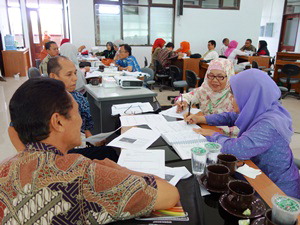|
|
Cycle 2 (2012 Deadline)
Improving process-skills of STEM undergraduate students in Indonesia through Problem-Based Learning (PBL): faculty member development, student assessment, and curriculum adjustment PI: Kamarza Mulia with co-PI Elsa Krisanti (Universitas Indonesia) U.S. Partner: Lisa Hunter (University of California, Santa Cruz) Project Dates: August 2013 to August 2016 Project WebsiteProject Overview 
Participants in the two-day problem-based learning workshop at Universitas Andalas (Photo courtesy Dr. Mulia).
|
This PEER project assessed the effectiveness of problem-based learning (PBL) in improving the process skills of chemical engineering students at Universitas Indonesia (ChE UI) while satisfying curriculum requirements. Skills assessed included problem solving, working in groups, lifetime learning, and critical thinking. The project also provided training to more than 1,100 university faculty members from throughout Indonesia over three years, by extension affecting thousands more of their students and making it possible to carry out longitudinal assessment studies of PBL effectiveness in improving students’ process skills. The main objective of the project is a paradigm shift of STEM faculty members from teacher-centered to student-centered learning (SCL), PBL in particular. The outcomes of the project should contribute directly to USAID’s stated higher education objectives in Indonesia, specifically with regard to improving instructional delivery through better teaching methods and more relevant curricula in STEM fields. Final Summary of Project Activities Invitations were sent to faculty members of selected campuses throughout Indonesia to attend an introductory workshop on SCL and PBL. In the workshops, participants discussed the SCL paradigm in teaching and learning, process skills required for a successful PBL implementation, and ways of converting a lecture-based course into the PBL format. Participants with strong motivation to implement PBL were invited to attend a facilitator workshop consisting of more practical topics such as how to conduct mini process skill workshops for students and PBL problems or case studies. These participants were then invited to apply for teaching grants and continuing support from the project leaders, and if necessary, a visit to their institutions, and eight were selected for this honor.
In total, the PEER team conducted 29 workshops attended by 1,173 faculty members from higher institutions across Indonesia (far more than the originally planned 6 workshops for 200 participants). In general, workshop participants responded well to the workshops, as indicated by their responses to some key questions in the post-event evaluation survey. Most had not learned the workshop materials previously (86%), and almost all (97%) were inspired and motivated to continue developing student-centered learning methods such as PBL. The survey also found that 81 workshop participants switched courses they teach over to a PBL model, three times as much as the target of 25 stated in the original grant proposal. The project is particularly relevant since the Ministry of Research and Higher Education requires Indonesian universities to implement more student-centered teaching-learning methods such as PBL.
To help their workshop participants in their ongoing teaching activities, the PEER team created several PBL implementation resources, most of which are available on the website https://pblkamarzaelsa.wordpress.com/. The website features articles on PBL and the
implementation of this student-centered teaching-learning method, trigger problems, and links to relevant sites including an online discussion board and Yahoo group.
In addition to offering the capacity building workshops, the PI and co-PI also worked with their colleagues at ChE-UA to integrate skills development modules into eleven PBL-based courses spread over the curriculum, to facilitate improvement of process skills of students in all the study programs (chemical engineering—regular program, chemical engineering—international program, and bioprocess engineering), while learning fundamentals in their chosen disciplines. These process skills improvement modules include teaching-learning and assessment activities linked to specific intended learning outcomes of the courses. During the project, the modules were implemented in courses involving more than 900 ChE-UI students from the incoming classes in the years 2010-2015.
PEER funds also supported the creation of a specially designed PBL classroom at the Faculty of Engineering - Universitas Indonesia in July 2015. The room accommodates 80 students learning in a group setting (PBL mode), equivalent 100 students in the lecture format. The renovation included 80 new chairs, two new projectors (one wireless), a new document camera, 15 new computer monitors for group discussion, a new motorized screen, and a new sound system. This classroom features a flexible seating arrangement conducive to small-group discussion, and each group has access to a computer monitor with a high-speed Internet access. The popular new classroom has a very high occupancy rate and is used by all teaching staff in the UI Faculty of Engineering.
Publications
Elsa Krisanti and Kamarza Mulia. 2016. Penerapan Metode Problem-Based Learning (PBL) [Application of the Problem Based Learning (PBL) Method]. Leutikaprio. 154 pp. ISBN: 978-602-371-264-9.
Kamarza Mulia and Elsa Krisanti. 2014. Communication Skills Course: Enhancing Presentation and Proposal Writing Skills of Chemical Engineering Students. In Proceedings of the 121st ASEE Conference, Indianapolis, June 15-18, 2014.
Back to PEER Cycle 2 Grant Recipients |
|
|
|




